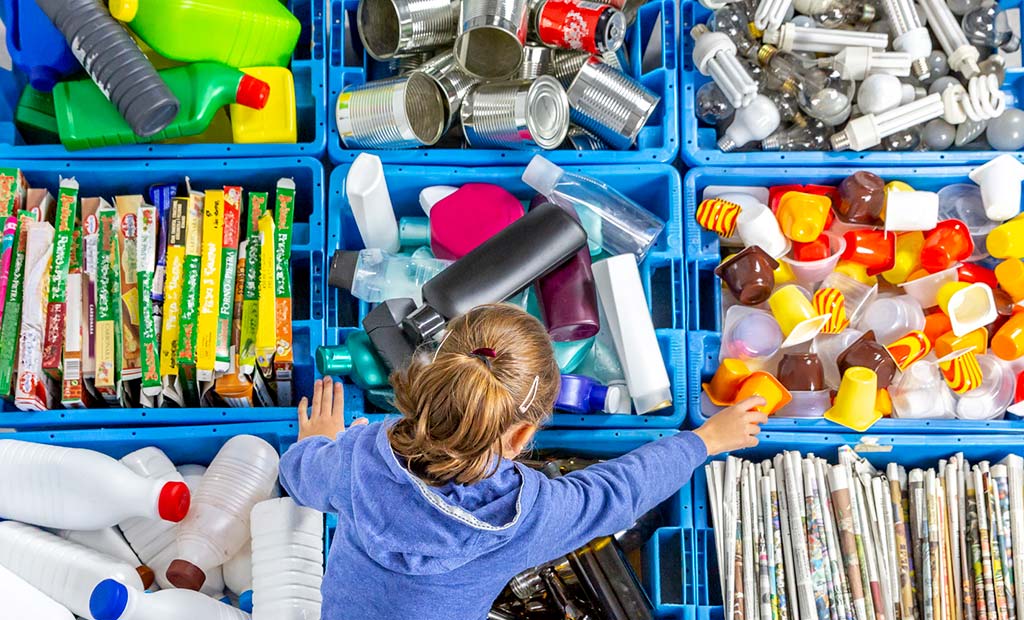The waste reducers
‘As a large four-form entry school, our fundraising events led to huge amounts of waste. With pressure from parents and a supportive leadership team, we decided to review how we could reduce waste, using the following criteria:
- Reduce: lower the amount of waste produced
- Reuse: use items repeatedly
- Recycle: use materials to make new products
- Recovery: recover energy from the waste
- Landfill: dispose of waste to landfill safely.
We gradually built up a range of strategies, which was crucial to our success. We began by using up our stock of single-use items, recycling them where possible, before replacing them with reusable alternatives. For example, hot drinks cups were recycled through a Costa scheme, and we received sponsorship to purchase reusable alternatives from Green Goblet. With these, visitors pay £1 deposit on their first purchase, which they get back when they return the cup. This has saved more than 1,000 disposable cups from going to landfill, and we found an extra fundraising stream in parents donating their deposit.
To overcome out-of-control recycling stations, we set up recycling reward stalls at events, rewarding visitors with small prizes and house points for delivering and sorting recyclable items, with no reward given for non-recyclables. This eliminated the need to sort waste, while teaching the community.
The summer and Christmas fair traditionally have craft stalls, but they were quiet and usually involved buying new materials. We looked at sustainable crafts based around upcycling and ran stalls where T-shirts were turned into bags and hairbands, fabric offcuts and stuffing made into fabric monsters, and old Christmas cards turned into new ones.
We’ve added the green policy to our PTA meetings, where we discuss how each fundraiser can become sustainable. This is particularly beneficial for new volunteers and ensures everyone knows our aims.
The kids have loved getting involved in recycling, and the feedback from parents and teachers has been positive. Everyone is so happy with what we’ve accomplished.’
Mary Horesh, events coordinator, Fielding Primary School PTFA, Ealing, London (962 pupils)
The all-round eco code
‘To help our PTA remember what’s important to us, we developed an “eco code”.
Before implementing this we started making changes, such as buying reusable decorations for our discos instead of balloons, and investing in reusable plates and cups for events. This made it much easier to write “we avoid single-use plastics whenever possible” into our code, as everyone had already seen that it could work well.
I used Eco-Schools’ ten topics for primary schools as a starting point, combining similar sections and omitting those that weren’t relevant to us as a PTA. Although our code isn’t particularly radical, and is aspirational rather than forming a strict set of rules, it’s helped us effect change.
For example, at our summer fair we have a popular game that uses water balloons. As it was such a favourite, suggesting changes was a bit scary, but after we implemented the code I felt more confident and suggested using sponges instead. The organisers weren’t keen but agreed to try it, and actually ended up preferring the sponges as they worked well and produced no litter.
One thing I would encourage other PTAs to do is to separate some of the eco-friendly measures from event costs. We’ve found that volunteers can get quite competitive about profits and are reluctant to spend extra money on reusable items. If the PTA plans to use items for future events, we list them as a general equipment expense rather than taking it from event profits. We also keep reminding everybody how it will save money in the long term.
Our work as a PTA now fits in with the school’s general teaching of reduce-reuse-recycle and Eco-Schools policies. Most of the changes have actually made us more profitable, which is great for the school.’
Rachel Khan, secretary, Friends of Culvers House Primary School, Mitcham, Surrey (462 pupils)
The community recycling hub
‘We recently branded an outdoor area of our school as the ECO HUB: a collection of bins for various recycling schemes that both raise money and help the environment.
One of our teachers developed our school’s recycling schemes, starting with crisp packets through TerraCycle. The PTA funded some bins, and, from there, we registered for more programmes and joined forces to promote the effort together.
The PTA recruited volunteers to keep the ECO HUB tidy and sort the recycling ready to post to TerraCycle, while the school produces a termly eco newsletter and pupil eco volunteers help to promote the recycling.
We’re part of six TerraCycle recycling programmes, through which we earn points that are redeemable for a cash payment to our school. We all play our part: families sort their recyclables into the appropriate bins, PTA volunteers maintain the ECO HUB, while the school promotes it through a termly eco newsletter and pupil eco volunteers.
We also support three charities by recycling milk bottle tops and stamps, and we recycle batteries through the local council.
The area has been a great success, and we’re in the process of improving it with new boxes and bins, signage and a mural to help strengthen the message. We are in talks with a local artist and the school about getting the children involved in this.
The ECO HUB has been a great success and is an excellent way to engage our children in climate change, reducing landfill and recycling our waste.’
Nathalie Dawson, PTA secretary, St James’ CofE School, Cheltenham, Gloucestershire (420 pupils)







